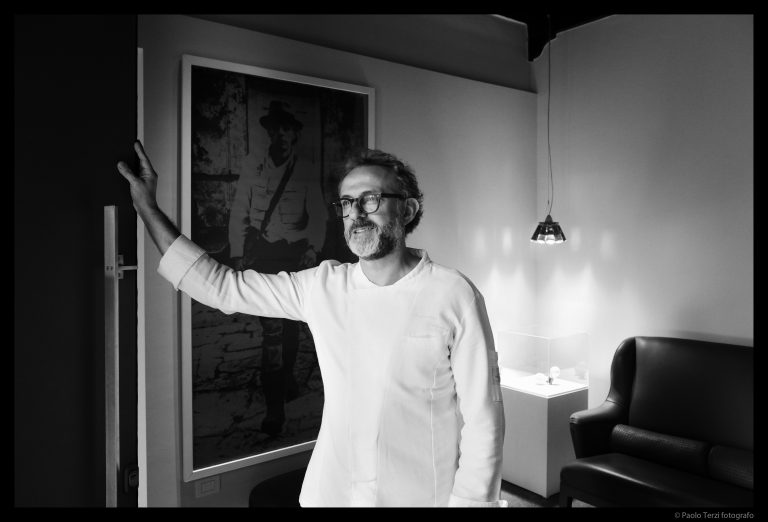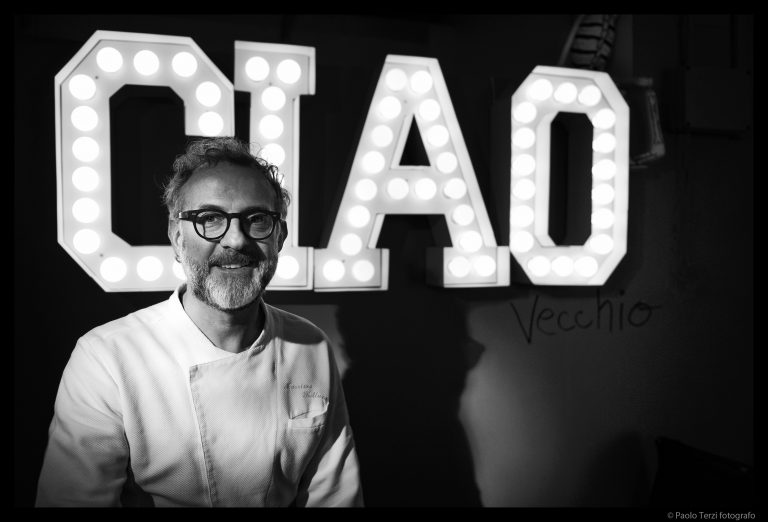How does the chef of the world's best restaurant fight food waste? Massimo Bottura, chef of Osteria Francescana, named #1 restaurant in the world in 2016, will answer this question and more during the Zero Waste Food conference on April 28-29, 2017. Hosted in partnership with The New School, the two-day conference brings together chefs, growers, architects and food entrepreneurs to explore ways we can create more sustainable food networks and eliminate food waste.
In anticipation of his keynote address — in which he'll discuss his own efforts to empower communities to fight food waste — we chatted with Chef Massimo about artistic expression, his passion project, Food for Soul, and what attendees can expect to take away from Zero Waste Food.

You’ve said that art is the motivation behind your dishes. How can we incorporate better practices into food production without comprising the idea of prepared dishes as artistic expression?
We have to think about beauty from a different perspective: It cannot stand by itself. The good and the beautiful are two sides of the same coin — they complete each other insofar as beauty without good isn’t beautiful at all, and good needs beauty to convey its message. It is often said about a person that he or she is “beautiful on the inside.” A brown banana or a bruised fruit still has a huge potential in terms of smell, flavor and texture.
The responsibility of the chef and all of us as home cooks is to find that inner beauty in each product and to make the most out of it in each phase of its lifespan. Straight out of the oven, a loaf of bread is good enough to be eaten as is. The day after, it will be perfect to make pappa al pomodoro or bread pudding. After two days, the bread will make perfect breadcrumbs for meatballs, passatelli and cakes. That’s what real beauty is: To make something valuable out of something that might be seen as not having any value at all. As we often say, “Something recovered is something gained.”
Can you share a few ways that you’ve incorporated the Zero Waste Food concept into your restaurant, Osteria Francescana?
At Osteria Francescana, we follow the “nose-to-tail” philosophy. Italian cuisine relies on this golden rule: Everything has to be used. Therefore, the bones and toughest cuts of meat can be recovered for a rich broth. The same goes for vegetable peels, stems and leaves. Our grandmothers have been doing this forever. For Italians, the full use of ingredients is deeply rooted in our history and culture.
Do you think it’s harder to have a sustainable kitchen in a big city like New York, as compared to Modena, a city that’s known for slow food?
The logistics and food systems of big cities are very complicated. Of course, the economy of a small town, small farm or small restaurant is much easier to navigate than a big one. We do feel, however, that it’s possible to create a network where food at risk of being wasted is salvaged to feed those most in need. Food for Soul is working towards a kind of sustainability that addresses the full usage of every resource available.
New York could offer potentially endless opportunities. Though it takes a big initial effort to identify the needs of the local community and the loopholes in the food distribution system, this is the starting point of every project of [my non-profit organization] Food for Soul. The common goal is the fight for social inclusion and food recovery.

What lessons do you hope to impart on Zero Waste Food participants?
If you can dream it, then you can do it. Showing people that we can do this, that anything is possible, could be inspiration for them to act. Action is what it’s all about! Everyone has his or her own role in the fight against food waste because we’re all in this together. What I can do is different from what you can do — my means and my tools as a chef are different than those of a politician, a philanthropist, a scientist or a social activist, but our commitment towards the cause is what unites us.
Your non-profit organization, Food for Soul, aims to create community kitchens around the world. How do these kitchens differ from regular “soup kitchens”?
I keep constantly repeating that Food for Soul is not a charity project, but a cultural one. The aim behind each “Refettorio”, or community kitchen, is not just to provide a warm meal to those in need. We conceive of nourishment in a more holistic sense: Feed the body and the soul. That’s the reason why we combine the know-how of architects, designers and artists in the design and decoration of the space. We want to create unique environments that express beauty, stimulate through art and facilitate operations through good design. The whole community can be inspired one way or another.
Moreover, we want our guests to feel welcomed and included. I still remember the very first nights at Refettorio Ambrosiano in Milan, when people were silently sitting at the table and eating their meals. The guests barely spoke to each other. Just a few weeks later, guests, volunteers and chefs were sharing the same table and the same meal. Everyone knew each other by name. Every gesture can play a fundamental role in creating a human connection — that’s why we want our volunteers to serve guests directly at the table just like restaurant service. Moreover, every meal has the possibility to reflect both the beauty of the environment and the “inner” beauty of recovered ingredients. It has to be tasty, nutritious and beautiful.
Can we expect to see a Food for Soul kitchen in New York anytime soon?
We are working hard to make it happen but believe me, it’s harder to open a soup kitchen than a restaurant. At this point, we’re aiming for 2018. We are constantly reminding people that this is not a pop-up initiative but a sustainable model that has to have solid foundation to continue to serve the community for years to come. This is our goal for everywhere we go, and in particular, in New York City. I would hate to let down the city I love most in the world!
Join the conversation: Register here for the Zero Waste Food conference.




